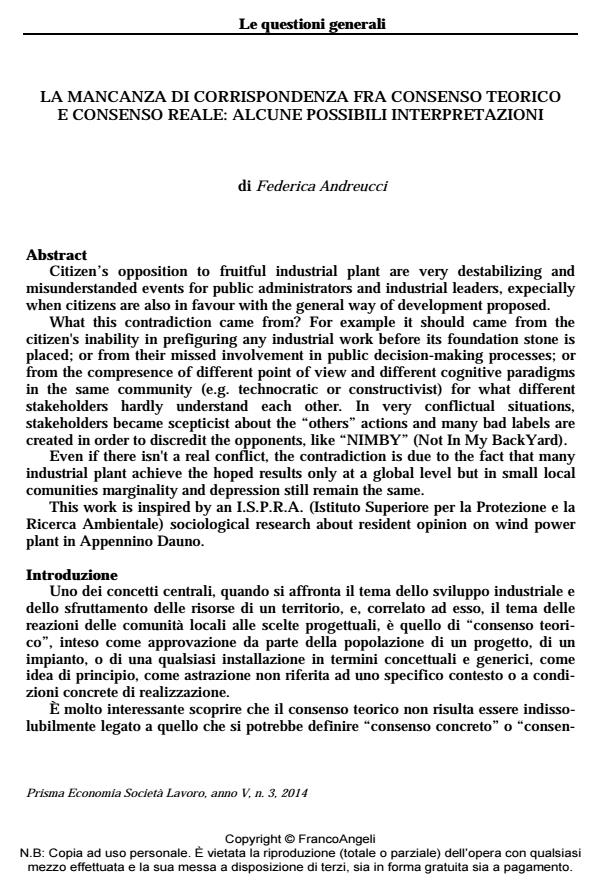La mancanza di corrispondenza fra consenso teorico e consenso reale: alcune possibili interpretazioni
Journal title PRISMA Economia - Società - Lavoro
Author/s Federica Andreucci
Publishing Year 2015 Issue 2014/3
Language Italian Pages 15 P. 63-77 File size 73 KB
DOI 10.3280/PRI2014-003006
DOI is like a bar code for intellectual property: to have more infomation
click here
Below, you can see the article first page
If you want to buy this article in PDF format, you can do it, following the instructions to buy download credits

FrancoAngeli is member of Publishers International Linking Association, Inc (PILA), a not-for-profit association which run the CrossRef service enabling links to and from online scholarly content.
Citizen’s opposition to fruitful industrial plant are very destabilizing and misunderstanded events for public administrators and industrial leaders, expecially when citizens are also in favour with the general way of development proposed. What this contradiction came from? For example it should came from the citizen's inability in prefiguring any industrial work before its foundation stone is placed; or from their missed involvement in public decision-making processes; or from the compresence of different point of view and different cognitive paradigms in the same community (e.g. technocratic or constructivist) for what different stakeholders hardly understand each other. In very conflictual situations, stakeholders became scepticist about the "others" actions and many bad labels are created in order to discredit the opponents, like "NIMBY" (Not In My BackYard). Even if there isn't a real conflict, the contradiction is due to the fact that many industrial plant achieve the hoped results only at a global level but in small local comunities marginality and depression still remain the same. This work is inspired by an I.S.P.R.A. (Istituto Superiore per la Protezione e la Ricerca Ambientale) sociological research about resident opinion on wind power plant in Appennino Dauno
- Douglas (1986) Risk Acceptability According to the Social Science, Russell Sage Foundation, London; tr. it. (1991) Come percepiamo il pericolo. Antropologia del rischio, Feltrinelli, Milano.
- Douglas (1992) Risk and blame. Essays in Cultural Theory, Routledge, London; tr. it. (1996) Rischio e colpa, il Mulino, Bologna.
- Maggi M. (2010) “Energia eolica e opinione pubblica”, V° articolo della Rubrica “TecnoRischio & Ambiente”, Biblioteca online “Lupo della Steppa” (http://www.steppa.net/html/tecnorischio/tecnorischio.htm).
- Maggi M. (2012) “Energia eolica e dinamiche sociali locali. Consenso e conflitto nello studio di alcuni casi italiani. Seconda relazione intermedia: approfondimenti presso alcuni comuni del Sub-Appennino Dauno”, Ispra Dipartimento Nucleare, Rischio Tecnologico e Industriale.
- Mannarini T., Roccato M. (2012) Non nel mio giardino. Prendere sul serio i movimenti Nimby, il Mulino, Bologna.
- Nocenzi M. (2002) Vivere l'incertezza. Sociologia, politica e cultura del rischio ambientale nelle insicurezze da inquinamento elettromagnetico, FrancoAngeli, Milano.
- Osti G, Pellizzoni L. (2003) Sociologia dell'ambiente, il Mulino, Bologna.
- Rifkin J. (1980) Entropy, a new world view, Foundation on Economic Trends; trad. it. (1982) Entropia, la fondamentale legge della natura da cui dipende la qualità della vita, Arnoldo Mondadori Editore, Milano.
- Sancassiani W. (2005) “Gestire i processi deliberativi: problemi e soluzioni” in Pellizzoni L. (a cura di) (2005), La deliberazione pubblica, Meltemi Editore, Roma, pp. 205-227.
- www.ilfattoquotidiano.it. www.qualenergia.it.
- Bobbio L., Zeppetella A. (a cura di) (1999) Perché proprio qui? Grandi opere e opposizioni locali, FrancoAngeli.
- Burningham K., Barnett J., Thrush D. (2006) “The limitation of the Nimby concept for understanding public engagement with renewable energy technologies: a literature review.” working paper 1.3 progetto di ricerca “Beyond Nimbyism: a multidisciplinary investigation of public engagement with renewable energy technologies”, “Esrc” (Economic and Social Research Council) Manchester, UK.
- Caramis A. (2010) “Le energie rinnovabili tra obiettivi globali e opposizioni locali: una valutazione retrospettiva”, Energia, Ambiente, Innovazione, Maggio-Giugno, ENEA, pag. 50-57.
- Cogliati Dezza V. (1993) Un mondo tutto attaccato. Guida all’educazione ambientale, FrancoAngeli, Milano.
Federica Andreucci, La mancanza di corrispondenza fra consenso teorico e consenso reale: alcune possibili interpretazioni in "PRISMA Economia - Società - Lavoro" 3/2014, pp 63-77, DOI: 10.3280/PRI2014-003006